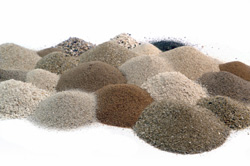Trace Minerals and Nutrient Absorption
 Minerals act as catalysts for many biological reactions within the body, including, muscle response, the transmission of messages through the nervous system, and the utilization of nutrients in food.
Minerals act as catalysts for many biological reactions within the body, including, muscle response, the transmission of messages through the nervous system, and the utilization of nutrients in food.
Why Trace Minerals?
Colloidal – Large sized molecule which does not get absorbed into the cell very well.
Chelated – Smaller sized molecule but still not well received by cell.
Ionic – Smallest – Well received by the cell.
Supplement Boost minerals are ionic minerals. These ionic minerals have the best chance of permeating the cell membrane within minutes of ingestion.
The amounts of trace minerals in our formula are not designed to provide “therapeutic levels” of the elements, but rather to restore electrolytic balance or homeostasis. This having been accomplished, the body will more readily absorb minerals from foods and supplements.
The formulation allows biovection through the cell walls, a process that helps draw nutrients into the cell where they are needed. Absorption of the trace-minerals actually begins in the mouth and is not dependent on the digestive product to activate it.
Trace minerals exist in very tiny amounts, but they are a key constituent in maintaining homeostasis in the body. This “natural regulator” is your body’s auto-regulatory mechanism and it works to keep your body in balance — or in a state of homeostasis. Why are trace elements considered essential? When a deficiency in the intake of trace minerals occurs, results consistently show an impairment of specific bodily functions. Trace minerals, dissolved in water, are far more bio-available than those present in food and thus are more effective.
Minerals are necessary for the normal functioning of the body's cells. The body needs large quantities of calcium, chloride, magnesium, phosphate, potassium, and sodium. These minerals are called macro-minerals. Bone, muscle, heart, and brain function depends on these minerals. The body needs small quantities of chromium, copper, fluoride, iodine, iron, manganese, molybdenum, selenium, and zinc. These minerals are called trace minerals. Except for chromium, all trace minerals are incorporated into enzymes or hormones required in body processes (metabolism). Chromium helps the body keep blood sugar levels normal.
According to the U.S. Senate Document #264, (1936), “It is bad news to learn from our leading authorities that 99 percent of the American people are deficient in minerals.” It continues, “Our physical well-being is more directly dependent upon the minerals we take into our systems than upon the calories or vitamins, or upon the precise proportion of starch, protein or carbohydrates we consume.”